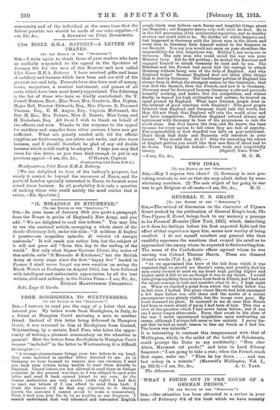GENERAL U. S. GRANT.
[To see Maros or ram " f3racrwrox."]
Sin,—The revival of discussion on the character of Ulysees Grant evoked by the publication of General King's book, The True Ulysses S. Crank brings back to my memory a postage in his Personal Memoirs (New York, 1885); which, describing as it does his feelings before his first expected fight and the effect of that experience upon him, seems now worthy of being recalled. I do not myself recollect any general who thus 'candidly expresses the emotions that swayed his mind as he approached the enemy whom be expected tofindarraitinghim. The name of the Confederate officer against whom he was moving was Colonel Thomas Harris. These are General Grant's words (Vol. I., p. 249) :— " As eve approached the brow of the hill from which it was expected that we should see Harris's camp, and possibly find his men ready formed to meet us, my heart kept getting higher and higher until it felt to me as though it was in my threat. I would have given anything then to have been back in Illinois,bat I had not the moral courage to halt and consider what to do • I kept right on. When we reached a point fromwhich the valley below was in full view, I halted. The place where Harris had been encamped a few days before was still there and the marks of a recent encampment were plainly visible, but the troops were gone. My heart resumed its place. It occurred to me at once that Harris had been as much afraid of mew I had been of hint This was a view of the question which 1 had never taken before ; but it was ono I never forgot afterwards. From that event to the close of the war I never experienced trepidation upon confronting an enemy, although I always felt more or less anxiety. I never for- got that he had as much reason to fear my forces as I had his. The lesson was valuable."
It is interesting to contrast this temperament with that of Wellington, which, in the midst of the battle of. Salamanca, could prompt the Duke to say confidently: "Mon cher Alava, Marmont est perdu!" and later to Lord Fitzroy Somerset "I am going to take a rest; when the French reach that copse, wake me." " Then he lay down . . and was fast asleep in a minute." (Maxwell's Wellington, Vol I,






































 Previous page
Previous page